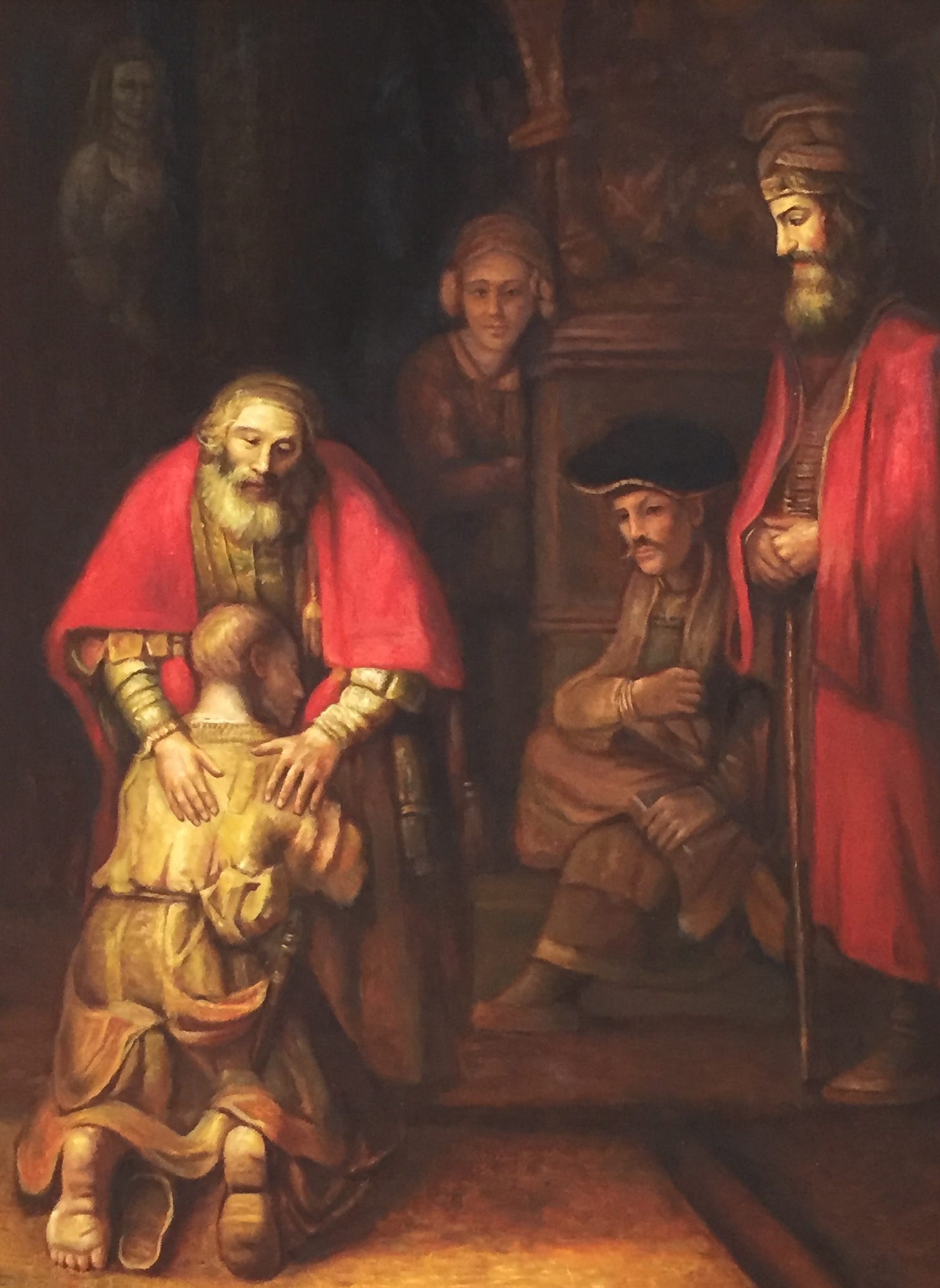Embodied Practices and Purification of Perception
Post Three in The Healing of Spiritual Senses
This post continues the series, The Healing of Spiritual Senses. Here are links to previous articles:
[Part 1] and [companion podcast episode]
[Part 2] and [companion podcast episode]
I talk about Dallas Willard A LOT! He has had a profound influence on my journey as a disciple of Jesus, and I bless God for the role he played in helping clarify my spiritual vision. As I reflected on my journey toward having my spiritual senses reawakened, I kept returning to two of his ideas that struck me as profound and memorable, but now have deeper meaning as I hear them in dialogue with the work of Sarah Coakley and Michael Polanyi.
In this post, I will engage first with a quote from Hearing God, showing how Coakley’s contemplative theology expands and sharpens what Willard gestures towards. Then I will turn to an idea from The Spirit of the Disciplines, which Polanyi’s epistemology of tacit knowledge helpfully illuminates.
In Hearing God, Willard offers a penetrating observation that arrested my attention and exposed a subtle distortion in my own desires. He writes:
Our failure to hear His voice when we want to is due to the fact that we do not in general want to hear it, that we want it only when we think we need it… [we] seem to lack desire to receive God’s word merely for what it is, just because we believe it is the best way to live.
Sometimes the most obvious truths prove the most elusive. Until encountering this thought, I had never questioned the deeper motivations beneath my pursuit of God. The grandeur of the object of my desire — namely, God! — seemed to justify the pursuit without qualification. But Willard’s challenge prompted me to ask a more foundational question: Why was I seeking God? Was it for intimacy, transformation, or merely for another powerful experience?
This marked the beginning of a shift from seeking spiritual intensity to cultivating relational depth as a disciple. It also opened me to the possibility that desire itself must be examined and, ultimately, reformed.
This brings me to Sarah Coakley’s vision of theology as not merely intellectual reflection but a formation of the self before God. In God, Sexuality, and the Self, she insists that theology must be done with the full engagement of the desiring, praying subject — a theologie totale (her phrase) in which contemplative practice is not optional but essential. She writes:
Systematic theology without contemplative and ascetic practice comes with the danger of rending itself void; for theology in its proper sense is always implicitly in via as practitional. It comes, that is, with the urge, the fundamental desire, to seek God’s ‘face’ and yet to have that seeking constantly check, corrected, and purged.
Our seeking must constantly be checked, corrected, and purged, because our desires constantly act upon us, skewing the way we relate to God, others, and ourselves.
Desire is never a neutral force, and when it’s misaligned it distorts our spiritual perception, often in subtle and subversive ways. A striking example of this appears in the parable of the prodigal son (Luke 15:11–32). We are quick to recognize how disordered desire sent the younger son away from his father, but less attentive to how it also misguides him as he returns.
Sitting among the pigs, the son is hollowed out by bent desires. “Longing to be fed with the pods that the pigs ate, and no one gave him anything” (Luke 15:16)
Eventually, he resolves to return home. But notice the script he prepares: “I am no longer worthy to be called your son; treat me like one of your hired servants” (Luke 15:19).
That speech reveals more than shame, it reveals how he sees his father. He sees his father as someone who might accept a broken son… but only as a servant. So he walks home, not in faith, but in fear, driven by a distorted vision of love, grace, and mercy.
This is familiar. Many of us move toward God with beliefs formed not by Christ, but by our own brokenness. Like the prodigal, we journey toward God on the strength of desperate scripts, with views shaped more by our inner fragmentation than God’s self-revelation.
This is why Sarah insists that every theological enterprise must begin and continue with prayer. Since we all come to God with imperfect desires and distorted perceptions, we shouldn’t count on our own understanding to yield the fruit we long for. Rather, we should be open to God to reform our desires and enlighten our perception, so that we can see and be different.
The turning point in the parable is not the son’s well-rehearsed speech, but the father’s response: He runs, embraces, and clothes his boy in the finest robe. Now, because of the father’s action, the son can begin to see himself and his father rightly.
“To know God,” Coakley writes, “is unlike any other knowledge; indeed, it is more truly to be known, and so transformed.”
So, true theology cannot be built on striving, because such striving is often fueled by disordered desire and dimmed vision. It must be done contemplatively — not grasping for divine things, as Adam and Eve did with the fruit, but receiving them, being enveloped by them, like an embrace.
Now, based on this, we must not adopt a passive perspective of prayer, especially contemplative prayer. It is attentive, not controlling, also consenting, malleable to what the Spirit needs to do.
This need for the purification of desire so that we might perceive rightly is not only central to Coakley’s contemplative theology but also resonates with the embodied spiritual formation proposed by Dallas Willard. As we have seen, distorted desire clouds vision; likewise, right desire, cultivated through sanctified practices — means of grace — clarifies it.
In The Spirit of the Disciplines, Willard writes:
We can become like Christ by doing one thing—by following him in the overall style of life he chose for himself. If we have faith in Christ, we must believe that he knew how to live. We can, through faith and grace, become like Christ by practicing the types of activities he engaged in, by arranging our whole lives around the activities he himself practiced in order to remain constantly at home in the fellowship of his Father.
Willard’s invitation to arrange one’s life around the activities of Christ resonates with Michael Polanyi’s insight into the nature of tacit knowledge. According to Polanyi, deep knowledge is not primarily acquired through propositional instruction, but through embodied imitation: a form of learning in which one interiorizes the mind of a master through sustained engagement with their practices.
He illustrates this through examples such as the chess student who studies a grandmaster’s games or the dancer who mimics a choreographer’s movements. In both cases, the student does not merely learn a set of techniques; they come to see the game or the dance through the “eyes” of the master. In other words, they come to know the master’s mind. Polanyi calls this “indwelling.” And this is as true for learning to play the violin as for learning virtue.
He suggests that “man’s skillful exercise of his body is a real entity that another person can know,” and crucially, “know only by comprehending it,” such that “the comprehension of this real entity has the same structure as the entity which is its object.” Stated simply, the learner doesn’t merely imitate technique; they interiorize the master’s pattern of seeing — they come to know by doing.
This aligns with Willard’s vision of discipleship: we do not become like Christ simply by affirming theological truths but by inhabiting Christ’s pattern of life through embodied apprenticeship. Through repeated engagement in the spiritual disciplines that Jesus practiced — solitude, prayer, fasting, service, etc — we are not merely performing religious duties, we are allowing our perception to be reshaped, our desires to be reformed, and our spiritual senses to be reawakened. The body, then, becomes a vessel of divine encounter, through which the spirit is quickened. If humanity’s fall involved a bodily turning away from God, then redemption involves a bodily return, metanoia.
Lest this emphasis on “doing” suggest that the restoration of spiritual perception is a human achievement, it must be stressed that each of these thinkers locate the origin of transformation in God. Hans Boersma states, “Sight is not something that we humans initiate in relation to God. God, according to Scripture, is the one who sees us first.” Coakley’s insistence on contemplative posture also makes this explicit: for her, perception is reformed not by self-effort, but by yielded, contemplative attentiveness to God and God’s action. Contemplative prayer is not a mechanism one can master, but a crucible wherein one can surrender; a place where the Spirit purifies desire and reforms the self. This is why, ultimately, it is in the praying body, the fasting body, the weeping and worshiping body that the eyes of the heart are enlightened in response to God’s saving work.
In the final post of this series, I’ll reflect on what the Christian tradition calls the beatific vision, that moment when our seeing is no longer dim or partial, but face to face. Drawing from Boersma and Loder, I’ll explore how our journey of formation leads toward a destiny of divine intimacy, where God is no longer the object of our perception, but the light by which we perceive all things.




Pastor Meshach, I have some Dallas Willard books and some of my favorite pastor friends and others have known and been discipled by the man . . . but I can't read him. I've tried, but his prose is too dense for me, or maybe I'm too dense for his prose, which is more likely the case. But you and James Bryan Smith I can read. Praise the Lord for distillation discipleship, huh!
I am totally drawn into this writing as again it is clarifying my vision and desire to strengthen my relationship with God. It challenges me to thing beyond what I have always believed as truth and resulted in me reaching for God differently. This quote, "a form of learning in which one interiorizes the mind of a master through sustained engagement with their practices", caused a turning point for me. I am rejoicing because I am not settling for where I am because you have opened a new way for me to move forward with this incredible series. I was waiting anxiously for it. Blessings upon blessing to you! Thank you!